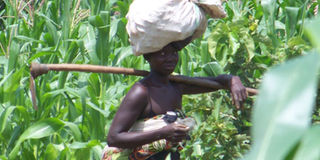Changing roles of Ugandan women

A woman heads home after tilling her garden. African women’s rights and responsibilities have changed significantly over the years. FILE PHOTO
One aspect of African life which reflects a society in transition is gender in relation to development. In many respects, the recent years have opened up many opportunities for women though progress in women’s emancipation continues to be stifled by cultural and traditional norms.
African women’s rights and responsibilities have changed significantly over the years. Whereas women’s rights in traditional African societies were closely matched to their responsibilities, the modern environment has not adequately defined women’s changing social, economic and political roles, leaving them at a distinct disadvantage.
True, women’s power and spheres of influence largely disappeared under the impact of colonialism and external religions, which upset the existing economic and social complementarity between the sexes.
As of today, new customary laws on marriage created in response to women’s anxieties about women’s independence transformed the previously fluid and negotiable relations into rigid duties and obligations for wives and women.
New forms of marriage
Women have come to be regarded primarily as dependent on men, making it unnecessary to plan and provide for their needs: They were supposed to work in the fields and at home to produce food and other crops to support their men, who worked in the visible, documented activities.
Later the introduction of new forms of marriage that granted enhanced property and inheritance rights to a minority increased the dependence of the majority of African women on men.
While the majority of women today don’t have the same access to resources as men, some resources, especially land, were at least made available to them in the traditional society.
In many societies women did not fully depend economically on their husbands and wielded power in spheres regarded as exclusively feminine which, nevertheless, guaranteed them some leverage in political processes.
In Uganda today, no stone is being left unturned in the empowerment of women with an aim of getting rid of the gender imbalance that has for the past years characterised our society.
For instance, in the education sector, in 1990 during the leadership of Prof George Kirya as Vice Chancellor, Makerere University acted fast by coming up with a new policy of affirmative action in order to raise the number of females joining the university while at the same time getting rid of the existing gender imbalance.
From then on, all female A-Level students were to get free extra 1.5 points on admission. The move has yielded education fruits, for today we are seeing more and more women graduating than in the past. Just in January this year during Makerere University’s 66th graduation ceremony, a total of 22 women were awarded Doctorate degrees in Sciences and in Humanities.
Politically, each Ugandan district today has a woman representative in Parliament and there is a reasonable number of female ministers in government where some important ministries like those of Internal Affairs and Education and Sports are being occupied by women.
In addition, the current Speaker of Parliament is Rebecca Kadaga who happens to be a woman. Actually, Uganda is one of the few African countries that has had a woman vice president and in our case, Dr Specioza Wandera Kazibwe.
In a sharp contrast, the past had little respect for women. Take an example of the pre- independent government where out of 90 members of Parliament only two were women, namely Florence Lubega and Rebecca Mulira.
Currently Ugandan women are guaranteed about 30 per cent of all elective political offices from grassroots to national level.
In her book, “Gender and the Politics of Decentralisation in Contemporary Uganda”, Josephine Ahikire notes that when Idi Amin captured power in 1971, he initially promoted women’s rights in a popular move but as time went on the Field Marshal banned all women’s organisations that were related to the promotion of the welfare of women, suggesting that all organisations come together under one umbrella-the National Council for Women.
Since then a lot of water has gone under the bridge with the gender imbalance of the past now almost nowhere to be seen, especially when it comes to sharing the national cake.
Looking around today, women are seen in many important positions of responsibility. To mention but a few, the executive director of KCCA, Jennifer Musisi.
So is the brain behind the Uganda National Roads Authority, Ms Allen Kagina, without forgetting the Commissioner General of Uganda Revenue authority (URA), Ms Doris Akol, and the current chairperson of the Uganda National Examinations board (Uneb), Prof Mary Okwakol.
Entertainment industry
In the entertainment industry there is a long list of women currently “terrorising” men and stealing all the show- the likes of like Joanita Kawalya of Afrigo, Irene Namubiru, Irene Ntale, and Juliana Kanyomozi.
In sports the trend continues with female individuals and teams performing exceptionally well. With the male national footballing team, the Cranes failing to qualify for major international tournaments on many attempts, the ladies-She Cranes did it for Uganda sometime back keeping our flag flying high during the 2015 Netball World Cup in Australia.
For sure, in almost in all corners of Uganda, there are hard working women somewhere. Mention the business sectors and look at all magnificent arcades decorating the city of Kampala and you will see females named after them.
Even in the media industry we now have many industrious female editors, sub-editors and senior reporters, something that was rare in the past.
Perhaps one big reason why Ugandan women deserve to celebrate this day.




